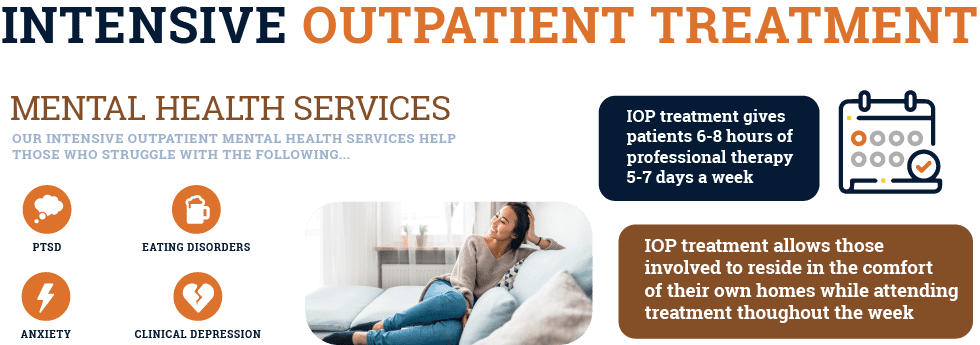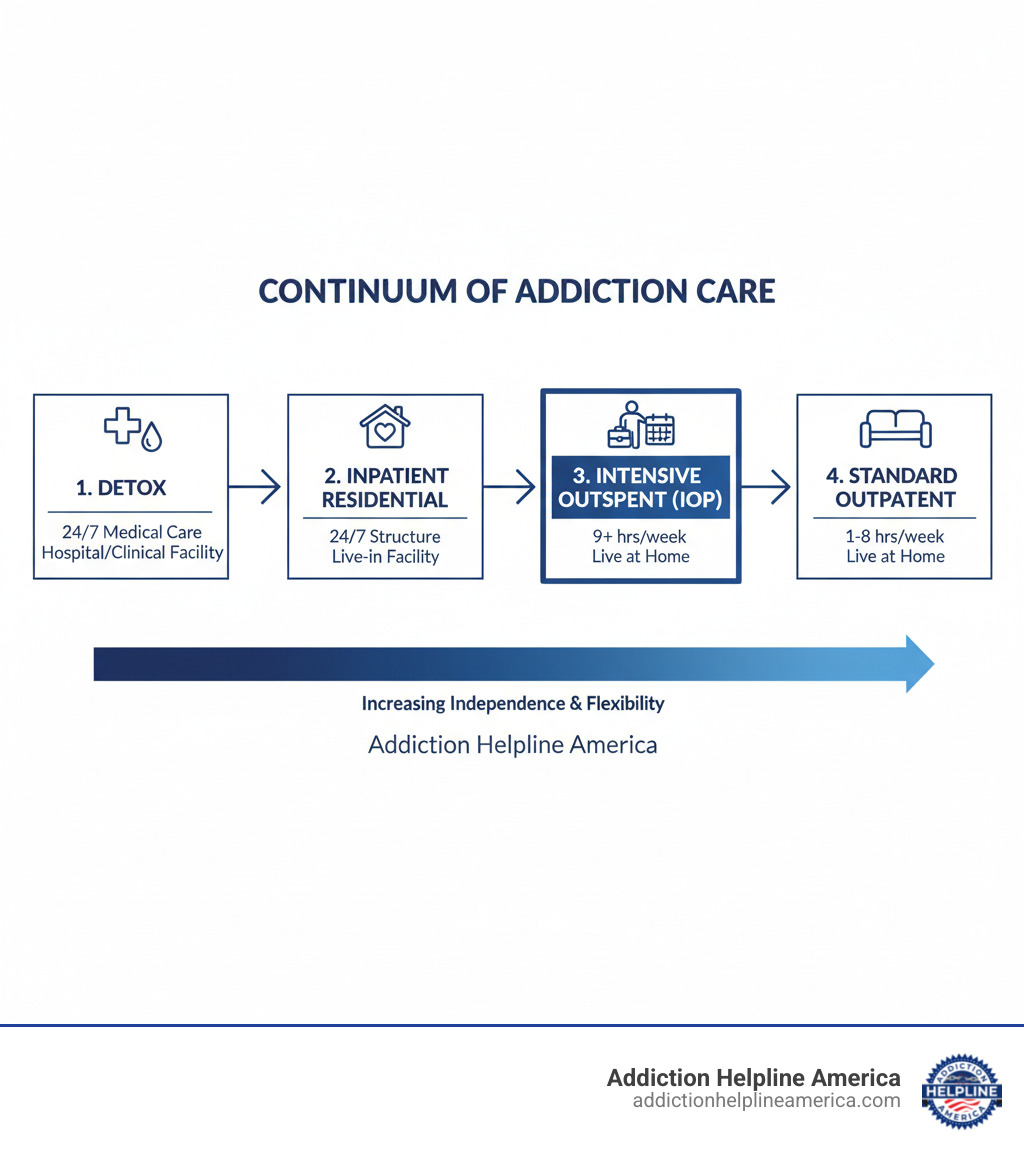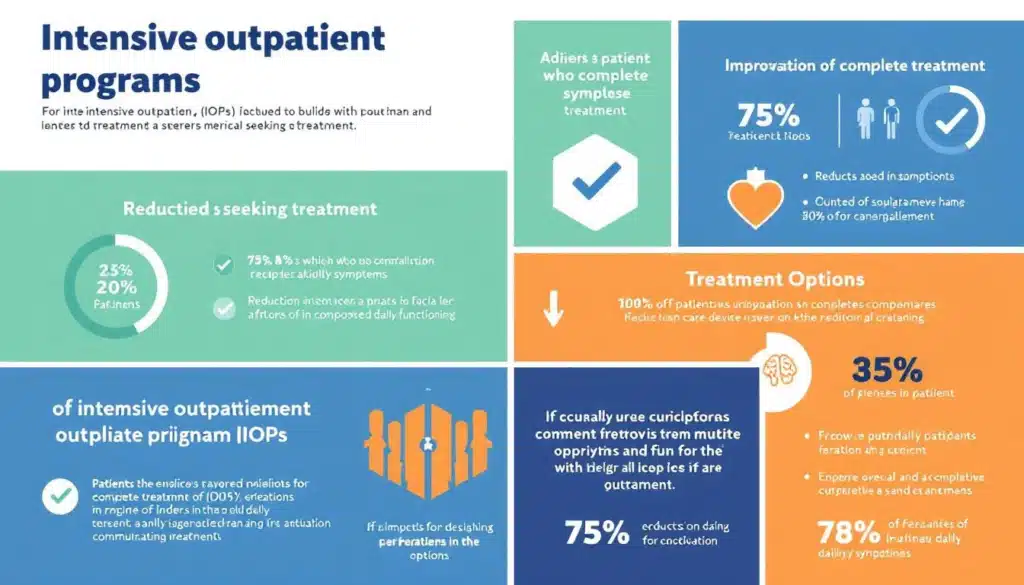
Why Intensive Outpatient Treatment Offers Hope Between Extremes
Intensive outpatient treatment provides a structured, therapeutic approach to recovery that bridges the gap between full-time residential care and weekly therapy sessions. For many facing substance use or mental health conditions, it offers a middle ground between treatment extremes.
What is Intensive Outpatient Treatment (IOP)?
- Structure: Minimum of 9 hours per week, typically spread across 3-5 days.
- Setting: You live at home and attend scheduled sessions at a treatment facility.
- Care Level: More intensive than weekly therapy, less restrictive than inpatient care.
- Services: Individual counseling, group therapy, family education, medication management, and case management.
- Best For: People who need structured support but can maintain work, school, or family responsibilities.
IOPs provide real structure while allowing you to stay connected to your daily life. Evidence shows that intensive outpatient programs are as effective as inpatient treatment for most individuals, leading to substantial reductions in alcohol and drug use at a significantly lower cost.
At Addiction Helpline America, we’ve guided countless individuals and families through finding the right level of care, including connecting them with intensive outpatient treatment programs that match their specific needs. Our team understands this is one of the most important decisions you’ll make, and we’re here to help you steer it with confidence.

Simple guide to intensive outpatient treatment terms:
What is an Intensive Outpatient Program (IOP)?
An intensive outpatient program is a form of addiction and mental health treatment that offers more support than weekly therapy without requiring you to live at a facility. It sits in the middle of the care continuum, allowing you to maintain your daily life—work, school, and family—while receiving structured, evidence-based treatment.
IOPs can serve as step-down care for those transitioning from inpatient rehab, providing a safety net as they regain independence. It can also be step-up care for individuals who find that weekly therapy isn’t enough to manage their symptoms.
A key benefit is practicing recovery skills in the real world from day one. You learn to handle triggers and stress as they happen, which can make the transition to long-term recovery much smoother.
How IOP Differs from Inpatient Care
The main difference between intensive outpatient treatment and inpatient care is where you sleep. Inpatient treatment requires living at a facility with 24-hour supervision, which is essential for those needing medical detox or who have severe, unstable conditions.
In an IOP, you live at home and attend scheduled treatment sessions. This provides powerful autonomy and helps you maintain a sense of normalcy. IOPs are also more cost-effective than inpatient programs because they don’t include room and board. For this to work, you need a stable and supportive home environment.
How IOP Differs from Standard Outpatient Therapy
If standard outpatient therapy is a weekly check-in, intensive outpatient treatment is a more significant commitment. Standard therapy usually involves 1-3 hours per week, which is suitable for milder conditions or aftercare.
IOPs require a minimum of nine hours per week, spread across 3-5 days. This higher session frequency and structured programming create routine and accountability, which are vital in early recovery. IOPs also have a strong group therapy focus, building a community of peers who understand your challenges and can support your journey.
| Feature | Inpatient Treatment | Intensive Outpatient Program (IOP) | Standard Outpatient Therapy |
|---|---|---|---|
| Living Situation | On-site at facility (24/7) | At home | At home |
| Supervision | 24-hour medical monitoring | Scheduled sessions, no 24/7 supervision | Scheduled sessions, no 24/7 supervision |
| Time Commitment | Full-time (24/7) | Minimum 9 hours/week (3-5 days) | 1-3 hours/week (1-3 days) |
| Cost | Higher (includes room & board) | Moderate | Lower |
| Ideal Candidate | Severe SUDs, detox needed, unstable conditions | Moderate SUDs, co-occurring conditions, step-down/step-up care, maintaining daily responsibilities | Mild SUDs, ongoing support, aftercare |
| Autonomy | Limited | High | High |
What Happens in an Intensive Outpatient Treatment Program?

An intensive outpatient program is a comprehensive, structured journey toward healing. A multidisciplinary team creates an individualized treatment plan using evidence-based practices. The focus is on psychoeducation, relapse prevention, and developing practical skills you can use in your daily life.
Core Components of Intensive Outpatient Treatment
Intensive outpatient treatment combines multiple services to support your recovery:
- Individual Therapy: A private space to work one-on-one with a therapist on personal issues and coping strategies.
- Group Counseling: The core of many IOPs, this provides peer support and a sense of community with others facing similar challenges.
- Family Therapy and Psychoeducation: Sessions that involve loved ones to improve communication and build a supportive home environment.
- Medication Management: Psychiatric professionals evaluate and manage medications for co-occurring mental health conditions or substance use disorders.
- Case Management: A case manager helps coordinate your care, connect you with resources, and plan for aftercare.
- Skills Training: Practical workshops on stress management, emotional regulation, and relapse prevention using techniques from CBT and DBT.
- Crisis Intervention: Most programs have protocols for handling emergencies, providing a safety net outside of session hours.
Therapeutic Approaches Used in IOPs
IOPs integrate various proven therapeutic methods to ensure effectiveness:
- Cognitive Behavioral Therapy (CBT): Helps you identify and change negative thought patterns and behaviors that fuel substance use or mental health symptoms.
- Dialectical Behavior Therapy (DBT): Teaches skills for managing intense emotions, tolerating distress, and improving relationships.
- Motivational Interviewing: A client-centered approach that helps you explore your own motivations for change and build confidence in your ability to succeed.
- 12-Step Facilitation: Introduces the principles of 12-Step programs like AA and NA to connect you with community-based support.
- Trauma-Informed Care: Creates a safe environment that acknowledges the role of past trauma in addiction and mental health, using specialized techniques to promote healing without re-traumatization.
Conditions Treated in IOPs
Intensive outpatient treatment is effective for a wide range of conditions for those who don’t need 24/7 supervision:
- Substance Use Disorders (SUDs): Treatment for addiction to alcohol, opioids, stimulants, benzodiazepines, marijuana, and other substances.
- Co-occurring Disorders: An integrated approach for those dealing with both a substance use disorder and a mental health condition (dual diagnosis). This is a key strength of IOPs, as treating both simultaneously is crucial for lasting recovery.
- Mental Health Conditions: IOPs also treat primary mental health issues, including depression, anxiety disorders, bipolar disorder, post-traumatic stress disorder (PTSD), and personality disorders, providing structured support and skill-building.
Is an IOP the Right Step for Your Recovery Journey?
Choosing the right level of care is a critical step. While intensive outpatient treatment is highly effective for many, it’s not a universal solution. The right fit depends on your specific needs, motivation, and home environment. An IOP requires you to do the hard work of recovery while navigating daily life, so a stable, supportive living situation is key.
Crucially, if you need medical supervision to detox safely, an IOP is not the right starting point. Medical detox must occur in a 24-hour care setting first.
At Addiction Helpline America, we help people figure out these questions every day. We can help you find the level of care that truly fits your life and needs.
Who is a Good Candidate for an IOP?
An intensive outpatient program may be a strong fit if you:
- Are transitioning from residential or partial hospitalization and need step-down support.
- Find that weekly therapy is no longer enough and need to step up your care.
- Have a moderate substance use disorder and have already completed detox.
- Are managing a co-occurring mental health condition that doesn’t require 24/7 care.
- Need to maintain work, school, or family responsibilities, as IOPs offer flexible scheduling.
- Are motivated to change and can commit to at least nine hours of therapy per week.
Who Might Need a Different Level of Care?
A higher level of care, such as inpatient or residential treatment, may be necessary if you:
- Are in an immediate psychiatric crisis (e.g., suicidal thoughts, psychosis).
- Require medical detoxification for alcohol, benzodiazepines, or opioids.
- Have a severe, unstable addiction and cannot maintain abstinence without 24/7 supervision.
- Lack a safe, stable, or supportive home environment.
- Have cognitive impairments that prevent meaningful participation in group therapy.
A professional assessment is the only way to determine the right level of care. Addiction Helpline America can connect you with professionals who provide these assessments and help you understand your options. We’re here to make the treatment landscape clearer.
The Evidence Behind IOP: Effectiveness and Key Benefits

When considering treatment, you want proof that it works. Intensive outpatient treatment is backed by solid research showing meaningful, lasting results.
The Proven Effectiveness of IOPs
Research consistently shows that IOPs lead to substantial reductions in alcohol and drug use. For most individuals, studies confirm that IOP outcomes are comparable to those of inpatient or residential treatment, but at a significantly lower cost. The Substance Abuse and Mental Health Services Administration (SAMHSA) supports this, noting the effectiveness of IOPs for clients who do not require 24/7 medical supervision. This high level of evidence means you can be confident in choosing an IOP when it’s the appropriate level of care.
The Benefits of Intensive Outpatient Treatment
Beyond clinical effectiveness, intensive outpatient treatment offers practical advantages for daily life:
- Flexibility: Maintain your work, school, and family commitments while receiving care.
- Lower Cost: IOPs are more affordable than inpatient care because they don’t include room and board.
- Real-World Practice: Immediately apply the coping skills you learn in therapy to real-life situations, building confidence and competence.
- Community Support: Group therapy connects you with peers who understand your struggles, reducing isolation and creating a strong support network.
- Autonomy: Managing your recovery while living at home reinforces your ability to make healthy choices independently.
- Seamless Transitions: IOPs provide a structured bridge for those stepping down from higher levels of care or a necessary boost for those stepping up from weekly therapy.
Navigating the Practical Side: Costs, Insurance, and Finding an IOP
Understanding the practical details of treatment is a key step. Let’s break down the costs, insurance, and how to find the right program.
Costs and Insurance Coverage for IOPs
The cost of an intensive outpatient program varies by location and services but is significantly less than inpatient care. Many insurance plans, including Medicare Part B, provide coverage for IOPs as they are an effective, evidence-based treatment. Private insurance coverage varies, so it’s crucial to verify your benefits before starting treatment. Call your insurance provider to ask about coverage, deductibles, and co-pays. Most treatment centers have financial counselors who can help you understand your options and may offer payment plans.
How to Find IOP Services and Support
Finding the right intensive outpatient treatment program doesn’t have to be complicated. Here are a few ways to find quality care:
- Consult your healthcare team: Your doctor or therapist can provide personalized referrals.
- Check with your insurance provider: They can provide a list of in-network facilities to minimize costs.
- Use trusted government resources: The Substance Abuse and Mental Health Services Administration (SAMHSA) and the National Institute of Mental Health (NIMH) offer tools to locate services.
- Reach out to Addiction Helpline America: This is where we come in. Our team provides free, confidential, and personalized guidance to help you find the right program. We work with a vast network of treatment centers across the country and can connect you with quality care that fits your unique situation.
When evaluating programs, consider location, services offered, staff qualifications, and whether they offer aftercare planning or telehealth options. The key is to find a program where you feel supported and confident in the approach. We’re here to help you make that connection.
Find Your Path to Recovery
Recovery is possible. Intensive outpatient treatment offers a proven path forward, balancing structured care with the flexibility to maintain your daily life. It’s a powerful option for those ready to heal while staying connected to work, family, and community.
IOPs meet you where you are, providing the support and skills needed for lasting change. Whether you’re stepping down from a higher level of care or need more support than weekly therapy, an IOP helps you build a foundation for recovery in the real world.
Choosing treatment can be overwhelming, but you don’t have to do it alone. Addiction Helpline America exists to provide personalized, compassionate guidance. Our team connects individuals and families across the nation with quality treatment centers that match their specific needs. We offer free, confidential support to help you understand your options, verify insurance, and find a program that feels right.
Your recovery journey is unique. Taking this step is an act of courage.
Find a drug and substance abuse treatment program that’s right for you, or call our helpline to speak with someone who can guide you toward the next right step. We’re here to help you find your way.
Our helpline is 100%
free & confidential
If you or someone you care about is struggling with drug or alcohol addiction, we can help you explore your recovery options. Don’t face this challenge alone—seek support from us.
Programs
Resources
Will my insurance
cover addiction
treatment?
We're ready to help
Find the best
drug or alcohol treatment
center
Are you or a loved one struggling with addiction? Call today to speak to a treatment expert.












